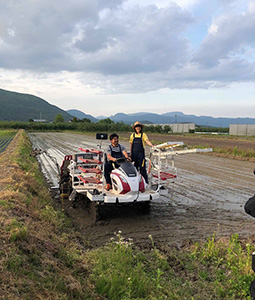
Kato planting rice seedlings 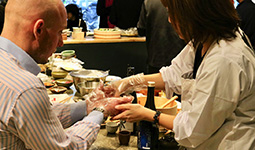
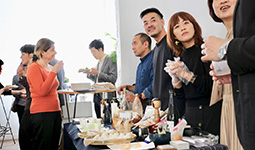
An event held in France by B-eat JAPAN introducing Fukushima products
November 2020
Growing Rice, Growing Recovery
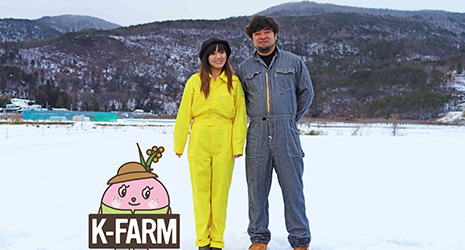
Kato Emi, a resident of Fukushima Prefecture, works in agriculture with her husband. They continue their activities towards recovery from the Great East Japan Earthquake, protecting local agriculture and employment while representing the farmer lifestyle and the foods of Fukushima.

Kato Farm Co., Ltd is an agricultural production company which, with 53 hectares, holds one of the largest collections of rice paddies in Fukushima City. The company’s managing director, Kato Emi, began her career in agriculture in 2009 together with her husband, Koji, by following in the footsteps of Koji’s grandfather, a farmer who specialized in rice production.
However, they experienced the Great East Japan Earthquake in March 2011 in their second year in farming, and the Fukushima Daiichi Nuclear Power Station Accident also occurred. Kato, who was pregnant with their third child at the time, looks back.
“At the time, we were confused about what to do next, lacking a sense of reality in words we weren’t familiar with, such as nuclear accident, radiation, sievert and becquerel. We took shelter outside the prefecture temporarily, but we returned to our home a month after the earthquake, wanting to know the state of the rice paddies, our home and Fukushima itself. We considered moving to other land and continuing farming, but in the end, we wanted to farm and live together with our family in Fukushima. Sharing this strong feeling, my husband and I decided to continue rice production here.”
They began cultivation of Ten no Tsubu rice, a variety of rice developed over fifteen years in Fukushima Prefecture. This rice has been praised for its uniform excellence, its luster, and its slightly sweet flavor and firm texture. Betting on Ten no Tsubu, which is only cultivated in Fukushima Prefecture, the Katos continued producing rice, focusing on this variety.
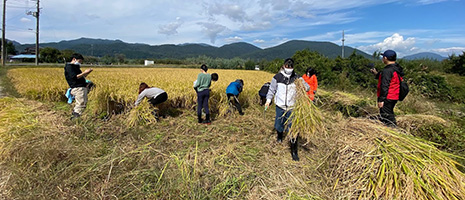
In December 2017, Kato Farm received certification from GLOBALG.A.P., a farm assurance program translating consumer requirements into Good Agricultural Practice, including initiatives to ensure the sustainability of agriculture from the perspectives of ensuring food safety, protecting the environment, and labor safety.
The Katos want others to know about the farmer lifestyle and Fukushima as it is, rather than just hear about the safety of Fukushima from farmers, and they have continued to steadily show daily farm work and the farmer lifestyle on social media. For this reason, they began to receive words of encouragement and gradually more and more people bought their rice.
At Kato Farm, they strive to produce safe, secure, and even better tasting rice, working to keep the soil in good condition using fewer pesticides and more organic fertilizer. In 2015, Kato Farm entered their Koshihikari rice into the Fifth KOME-1 Grand Prix, a contest to decide the rice with the most delicious flavor in Japan, and by finishing with a high ranking, the delicious flavor of their rice was proven.
Kato took a leading role in 2018 by launching B-eat JAPAN, an organization with the goal of showcasing the charm of the food of Fukushima both in Japan and abroad. Four farmers within the prefecture became members, and the organization has so far sold onigiri rice balls and rice in Vietnam, France and Thailand, hosting events to convey the charm of Fukushima. All of these events were successful, creating connections with local people and industries connected with the food industry.


In September 2020, the Katos also opened the Yellow Beer Works craft beer brewery (Ozaso, Fukushima City) using barley and hops cultivated at home as ingredients to create jobs for the off-season in farming and to stabilize farm management.
Kato says, “We have steadily worked to appeal directly to visitors through lectures, events, and so on in addition to beginning to release information online about our activities. This comes from a desire to help not just ourselves but also to protect agriculture for all of Fukushima. The possibilities for agriculture in Fukushima are limitless. We hope to carry out activities in the future that will set all of Fukushima in the best possible direction by putting effort into training young farmers.”

